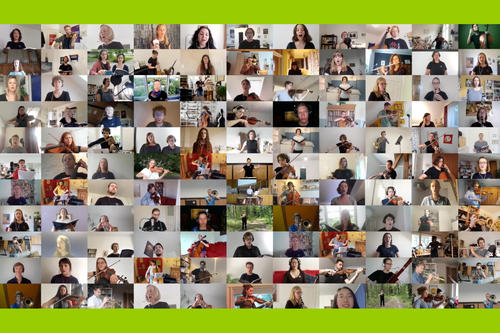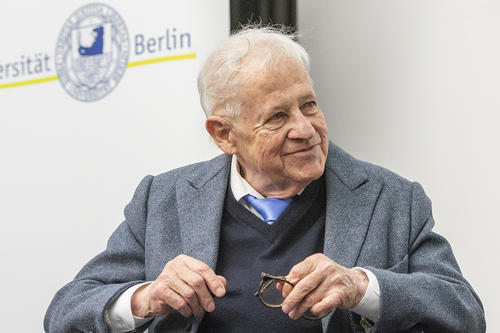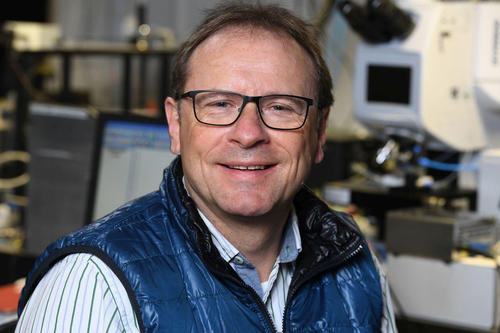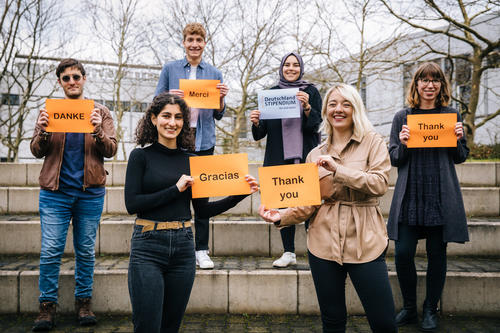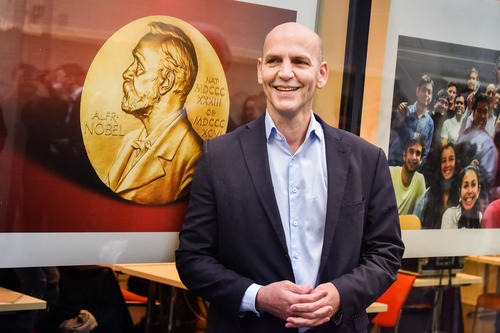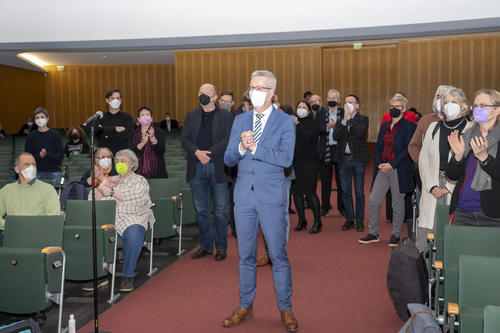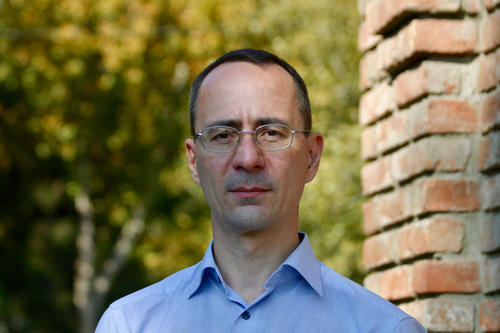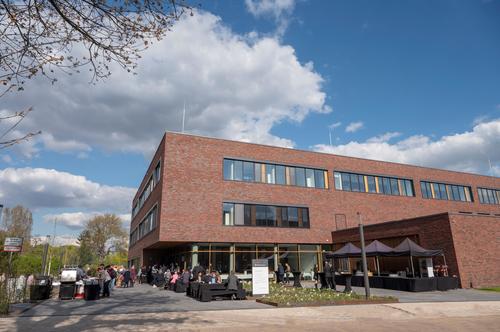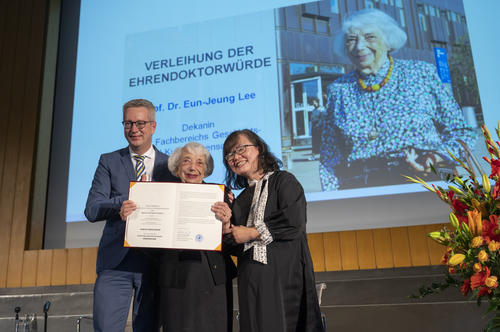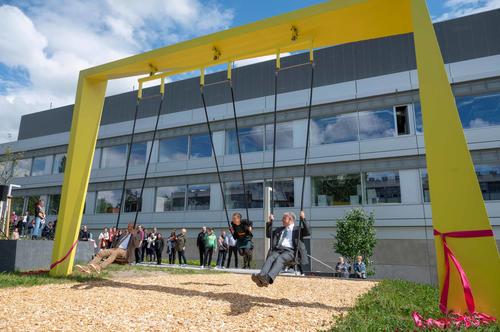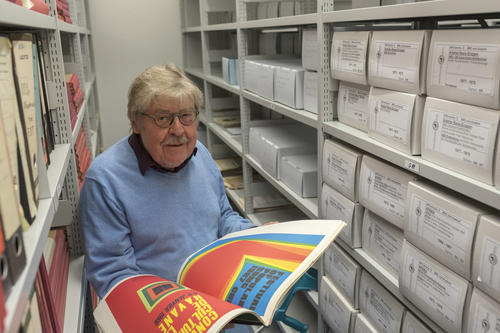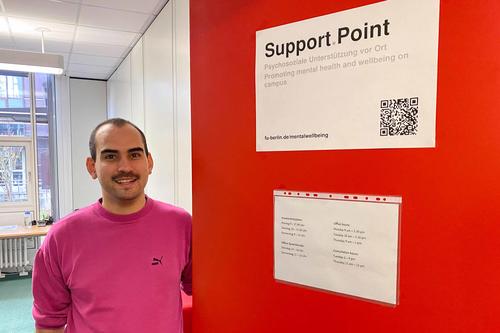The 2020s
March 23, 2020
Freie Universität switched to “minimal on-site operations.” In order to curb the spread of the coronavirus and reduce the risk of infection, public life in Germany more or less shut down. This affected the approximately 33,000 students, 4,000 doctoral students, 4,500 employees, and 500 professors at Freie Universität Berlin. Seminars and lectures, exams and meetings were moved to virtual spaces in the shortest possible time so that as few people as possible were actually on campus.
October 1, 2020
The Berlin University Alliance (BUA) set up a collaboration platform in the form of a public corporation (KöR). As the central administrative unit of the BUA, the collaboration platform provides an efficient, stable, and legally secure framework for the four members of the BUA: Freie Universität Berlin, Humboldt-Universität zu Berlin, Technische Universität Berlin, and Charité – Universitätsmedizin Berlin.
November 23, 2020
Klaus Heinrich died at the age of 93. A philosopher of religion, Heinrich taught at the Institute for the Study of Religion from 1969 to 1995. In 1948 he was one of the founding students of Freie Universität. In 2018, he took part in a panel discussion in Dahlem as part of the ceremony marking the university’s 70th anniversary.
February 16, 2021
The Executive Board approved the Diversity Strategy and Action Plan. The goal is to achieve an environment for teaching, learning, and working that fosters accessibility and opposes discrimination. The plan emphasizes the importance of respectful collaboration and structures that promote equity.
July 1, 2021
Freie Universität established a central ombudsperson office to support good research practice. Physics professor Joachim Heberle was the first ombudsman to be appointed. The task is to advise researchers on issues concerning good research practice, to moderate conflicts, and to facilitate communication between the ombudspersons in the various academic departments.
July 14, 2021
The Academic Senate approved a mission statement for teaching and learning. It formulates objectives and quality standards for successful teaching and learning at Freie Universität and serves to establish an active culture of teaching and learning as a characteristic of the university. It was preceded by a year-long participatory process “Teaching and Education in 2030. Shaping the Future Together,” which was open to all the members of the university. Those interested participated in 17 working groups to develop objectives and concrete measures for a teaching and education strategy.
2021
Ten-year anniversary of the Deutschlandstipendium scholarships. During the anniversary year 255 students at Freie Universität were supported with a Deutschlandstipendium scholarship. Up through 2021 more than 800 students at Freie Universität have received the scholarship, since it was set up in 2011. Students who are academically high achievers as well as socially committed are eligible to receive 300 euros monthly, half of which is provided by the German federal government and the other half by private individuals, foundations, associations, nonprofit organizations, or companies.
December 2021
The chemist Benjamin List received the Nobel Prize in Chemistry (together with the British-American chemist David MacMillan) for his work on asymmetric organocatalysis. List, who graduated from Freie Universität in 1993, conducts research at the Max-Planck-Institut für Kohlenforschung in Mülheim an der Ruhr.
February 16, 2022
Professor Günter M. Ziegler just after his re-election was announced.
Image Credit: Bernd Wannenmacher
The president of the university, Günter M. Ziegler, was re-elected. A professor of mathematics, Ziegler prevailed against Beatrix Busse, a professor of English and vice rector at the University of Cologne. The president’s new four-year term began on July 6, after the official re-appointment by the Berlin Senate. The executive vice president of the new Executive Board is Professor Verena Blechinger-Talcott. The other vice presidents are Professor Georg Bertram (VP2), Professor Sven Chojnacki (VP3), and Professor Petra Knaus (VP4).
March 2022
Dr. Tobias Stüdemann is the head of the Eastern European Office of Freie Universität.
Image Credit: Privat
In reaction to Russia’s attack on Ukraine, Freie Universität closed its Liaison Office in Moscow, which the university had founded in 2010. At the same time Freie Universität put all collaborations with institutions in Russia on hold. In October the university opened a new Eastern European Office in the Georgian capital, Tbilisi, headed by Tobias Stüdemann. The focus of activities also shifted, to cover the entire region from Belarus to Mongolia.
April 26, 2022
The Veterinary Center for Resistance Research opened on the veterinary campus in Berlin-Düppel. There 90 scientists including researchers in the fields of virology, parasitology, and immunology, aim to find out how drug-resistant pathogens can be controlled. The new building cost 60 million euros and is the first of its kind in Europe.
May 25, 2022
Margot Friedländer (center) between the president of the university, Prof. Dr. Günter M. Ziegler (at left) and the dean of the Department of History and Cultural Studies, Prof. Dr. Eun-Jeung Lee (at right)
Image Credit: Bernd Wannenmacher
The Holocaust survivor and writer Margot Friedländer was awarded an honorary doctorate from the Department of History and Cultural Studies. She was recognized for “her outstanding achievements as a contemporary witness of persecution and survival in the Shoah, as a committed advocate of public history, as an ambassador of remembrance and humanity for younger generations.”
May 30, 2022
The SupraSwing by artist Katja Marie Voigt next to the research building.
Image Credit: Bernd Wannenmacher
The SupraFAB building was opened. On Altenstein Strasse in Dahlem, it houses biology labs where scientists conduct research on blocking virus-cell interactions for example. The goal of this research is to prevent viruses from docking onto the surface of human cells, thus making humans sick. This line of research could one day lead to treatments to prevent the spread of coronaviruses. The abbreviation SupraFAB stands for “Supramolecular Functional Architectures at Biointerfaces.” The construction of the building cost 48 million euros. Like the new Veterinary Center, it was financed with funds from the German federal-state program of the Joint Science Conference (GWK) earmarked for new research buildings and large-scale equipment.
September 3, 2022
Siegward Lönnendonker died at the age of 83. A sociologist and archivist, he had been a chronicler of Freie Universität since the 1970s. He set up and managed an archive of the Extra-Parliamentary Opposition (APO). Today it is part of the collections of the University Archives.
October 2022
The support.points welcome graduate and undergraduate students from all the academic departments.
Image Credit: Annika Middeldorf
The Center for Academic Advising and Psychological Counseling established “support.points,” where students and doctoral candidates can go for immediate help if they have mental health concerns or psychological problems. With eight different locations, the support.points are part of the university’s overarching mental health program, a project promoted by the Executive Board in response to a growing need for counseling and support structures. Studies showed that many students experienced a great deal of strife during the pandemic due to the various restrictions.

